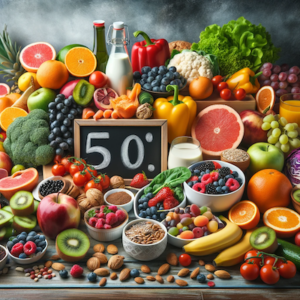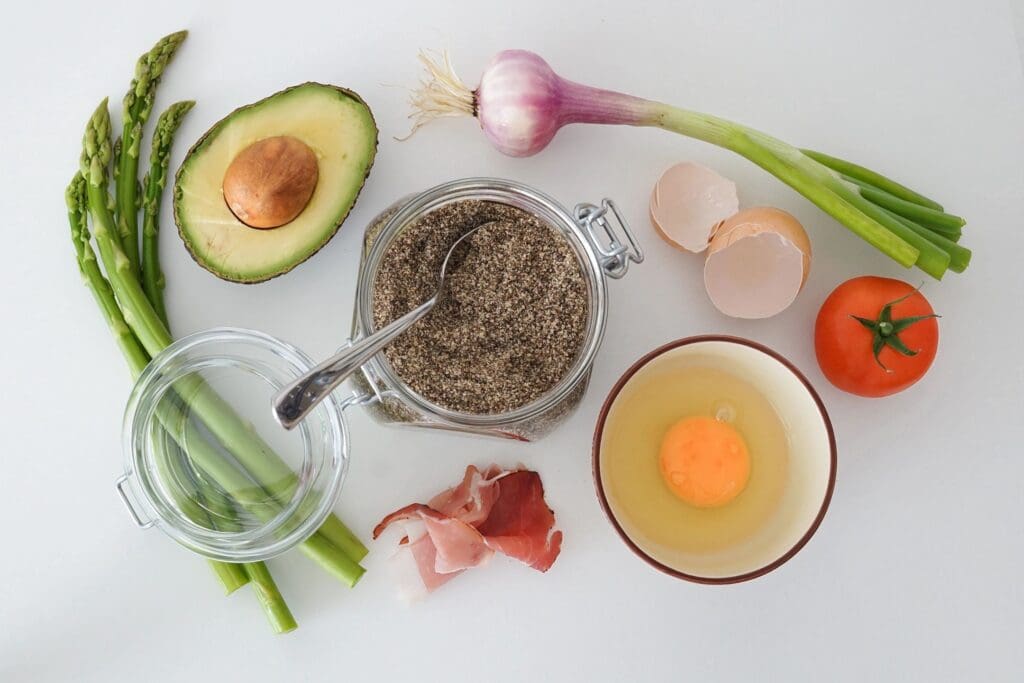
Are you ready to unlock the secret to age-defying nutrition? Imagine feeling vibrant, energized, and full of life, no matter your age. Well, it turns out that the key to maintaining your health as you reach your 50s and beyond lies in the power of nutrition.
In this blog post, we will delve into the world of age-defying nutrition and uncover the top 50 foods that can help you achieve a healthy and thriving lifestyle. As we age, our bodies undergo various changes. Our metabolism slows down, our bones become more brittle, and our immune system may not be as robust as it once was.
But fear not! Incorporating the right foods and healthy eating practices into your diet can work wonders by counteracting these effects and promoting overall well-being. In this comprehensive guide, we will explore the top foods for maintaining your health over 50, categorized by various food groups. From fruits and vegetables bursting with antioxidants to lean proteins packed with essential amino acids, we will reveal the nutritional powerhouses that can help you thrive in your golden years.
We will also dive into the specific benefits these foods offer, such as improving digestion, boosting brain health, and supporting heart health. So, whether you’re already in your 50s or simply want to future-proof your health, get ready to discover a wide range of delicious and nutritious foods that can contribute to your age-defying journey. Let’s take a deep dive into the world of age-defying nutrition and unlock the secrets to a healthy you!
Whole Grains: Fueling Your Body with Fiber and Nutrients
When it comes to age-defying nutrition, whole grains are an essential component of a healthy diet. These grains, such as brown rice, quinoa, and whole wheat bread, are packed with fiber and essential nutrients that can fuel your body and support overall well-being.
Fiber is particularly important for individuals over 50 as it aids in digestion and helps prevent constipation, a common issue in this age group. Additionally, fiber-rich foods can help regulate blood sugar levels and lower the risk of developing chronic conditions such as heart disease and type 2 diabetes.
Whole grains also provide a wealth of vitamins and minerals that are crucial for maintaining optimal health. For example, they are a great source of B vitamins, which play a key role in energy production and brain function. They also contain important minerals like magnesium, selenium, and zinc that support various bodily functions.
To incorporate more whole grains into your diet, consider swapping refined grains for their whole grain counterparts. For instance, opt for whole wheat pasta instead of regular pasta or choose brown rice over white rice. You can also experiment with different types of whole grains like quinoa or barley to add variety to your meals.
The Impact of Nutrition on Aging
Nutrition plays a vital role in the aging process. As we get older, our bodies require specific nutrients to support healthy aging and prevent age-related diseases. By focusing on proper nutrition, you can enhance your overall well-being and promote longevity.
One key aspect of nutrition for aging well is ensuring an adequate intake of vitamins and minerals. These micronutrients are involved in numerous physiological processes within the body and play a crucial role in maintaining optimal health.
Vitamin D is especially important for individuals over 50 as it supports bone health by aiding in calcium absorption. As we age, our bones become more susceptible to fractures and osteoporosis, making vitamin D crucial for maintaining strong and healthy bones.
Another essential nutrient for aging well is omega-3 fatty acids. These healthy fats have been shown to reduce inflammation, support brain health, and promote heart health. You can find omega-3 fatty acids in fatty fish like salmon, walnuts, flaxseeds, and chia seeds.
Antioxidants are also key players in age-defying nutrition. These compounds help protect the body against oxidative stress and cellular damage caused by free radicals. Fruits and green vegetables are excellent sources of antioxidants, so be sure to include a variety of colorful produce in your diet.
Fruits and Vegetables: Nature’s Antioxidant Powerhouses
When it comes to age-defying nutrition, fruits and green vegetables are true powerhouses. Packed with vitamins, minerals, fiber, and antioxidants, these colorful foods offer a wide range of health benefits for individuals over 50.
Fruits are not only delicious but also provide essential nutrients that support overall well-being. For example, berries such as blueberries, strawberries, and raspberries are rich in antioxidants that help protect against cellular damage and reduce the risk of chronic diseases like heart disease and cancer.
Citrus fruits like oranges and grapefruits are excellent sources of vitamin C, which supports immune function and collagen production for healthy skin. Additionally, they contain flavonoids that have been shown to improve cognitive function.
Vegetables are equally important for maintaining optimal health as you age. Leafy greens like spinach and kale are packed with vitamins A, C, K, folate, iron, calcium, magnesium – all of which play vital roles in supporting bone health.
Lean Proteins: Building Blocks for a Strong and Healthy Body
Protein is an essential macronutrient that becomes even more important as we age. It serves as the building block for tissues, muscles, and organs, helping to maintain a strong and healthy body.
As we get older, our bodies may experience muscle loss or a decrease in muscle mass. Consuming adequate amounts of protein can help counteract this effect and support muscle maintenance and repair.
Lean proteins such as chicken, turkey, fish, tofu, beans, and lentils are excellent choices for individuals over 50. These protein sources are low in saturated fat and provide essential amino acids that our bodies need for various functions.
In addition to supporting muscle health, lean proteins also play a role in immune function, hormone production, and wound healing. They can also help regulate appetite and promote satiety, making them beneficial for weight management.
Healthy Fats: Nourishing Your Brain and Supporting Heart Health
Contrary to popular belief, not all fats are bad for you. In fact, healthy fats are an essential part of a balanced diet and can provide numerous health benefits.
Omega-3 fatty acids are particularly important for brain health and have been shown to reduce the risk of cognitive decline associated with aging. These fats can be found in fatty fish like salmon and trout as well as walnuts, flaxseeds, chia seeds.
Monounsaturated fats found in foods like avocados, olive oil, nuts (such as almonds), seeds (such as pumpkin seeds), are known to support heart health by reducing LDL cholesterol levels (the “bad” cholesterol) while increasing HDL cholesterol levels (the “good” cholesterol). They also help reduce inflammation in the body.
Superfoods: Unlocking Extraordinary Health Benefits
The term “superfoods” refers to nutrient-dense foods that offer exceptional health benefits. These foods are typically rich in vitamins, minerals, antioxidants, and other beneficial compounds.
One such superfood is blueberries. These small berries are packed with antioxidants that help protect against cellular damage and reduce the risk of chronic diseases. They are also a good source of fiber and vitamin C.
Another superfood is kale, a leafy green vegetable that is rich in vitamins A, C, K, and minerals like calcium and magnesium. Kale also contains compounds called glucosinolates that have been shown to have anti-cancer properties.
Other superfoods include salmon (rich in omega-3 fatty acids), chia seeds (high in fiber and omega-3 fatty acids), and turmeric (a spice with powerful anti-inflammatory properties).
Hydration: Staying Refreshed and Rejuvenated
Proper hydration is essential for overall health, especially as we age. Water plays a crucial role in various bodily functions such as digestion, circulation, temperature regulation, and nutrient absorption.
Dehydration can lead to numerous health issues, including fatigue, constipation, dizziness, and impaired cognitive function. It’s important to drink an adequate amount of water throughout the day to stay hydrated.
In addition to water, you can also hydrate your body with other fluids like herbal teas or infused water for added flavor. Fruits and vegetables with high water content like cucumbers or watermelon can also contribute to your hydration needs.
Key Vitamins and Minerals for Aging Well
As we age, our bodies may require additional vitamins and minerals to support optimal health. Here are some key nutrients that play a crucial role in aging well:
Vitamin B12: This vitamin is essential for nerve function and the production of red blood cells. It can be found in animal products like meat, fish, eggs, and dairy or in fortified plant-based foods.
Calcium: Adequate calcium intake is crucial for maintaining strong bones and preventing osteoporosis. Dairy products, leafy greens, and fortified plant-based milk alternatives are good sources of calcium.
Vitamin E: This antioxidant vitamin helps protect against cellular damage and supports immune function. Nuts, seeds, and vegetable oils are excellent sources of vitamin E.
Magnesium: Magnesium plays a role in over 300 enzymatic reactions in the body and is important for bone health, muscle function, and energy production. It can be found in nuts, seeds, whole grains, legumes, and leafy greens.
Mindful Eating: Enhancing Digestion and Absorption
Mindful eating is a practice that involves paying attention to the present moment while eating. By practicing mindful eating techniques, you can enhance digestion and absorption of nutrients from your meals.
One aspect of mindful eating is slowing down during meals and savoring each bite. This allows your body to properly digest food and signals fullness more effectively.
Chewing your food thoroughly is another important aspect of mindful eating. Chewing breaks down food into smaller particles, making it easier for your body to absorb nutrients.
Avoiding distractions while eating can also help promote mindful eating. Instead of watching TV or scrolling through your phone during meals, focus on the flavors, textures, and smells of your food.
Conclusion: Embracing Age-Defying Nutrition for Healthy Eating Habits and a Thriving You
Embracing age-defying nutrition is crucial for maintaining a healthy and thriving lifestyle, especially for individuals over the age of 50. By incorporating the right foods into your diet, you can nourish your body and support overall well-being.
Nutrition plays a significant role in promoting longevity and preventing age-related conditions. Include a variety of nutrient-dense foods in your meals. Focus on consuming foods rich in antioxidants, such as berries, leafy greens, and colorful vegetables. These powerful antioxidants help combat free radicals, which can cause cellular damage and accelerate aging.
Incorporate foods that are high in omega-3 fatty acids, such as fatty fish like salmon and trout, flaxseeds, and walnuts. Omega-3 fatty acids promote heart health, reduce inflammation, and support brain function.
Furthermore, prioritize foods that are abundant in vitamins and minerals, such as calcium-rich dairy products, fortified cereals, and green leafy vegetables. These nutrients are essential for bone health and can help prevent osteoporosis.
In conclusion, embracing age-defying nutrition is essential for promoting healthy eating and a thriving lifestyle as you age. By incorporating a variety of nutrient-dense foods into your diet, you can nourish your body and support overall well-being. Remember to consult with a healthcare professional or registered dietitian to personalize your nutrition plan based on your specific needs.




